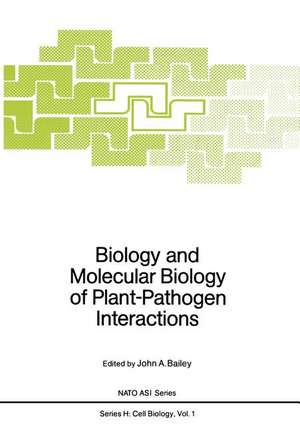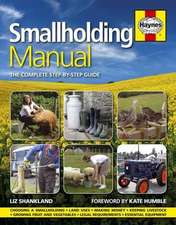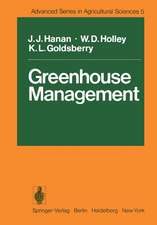Biology and Molecular Biology of Plant-Pathogen Interactions: Nato ASI Subseries H:, cartea 1
Editat de John A. Baileyen Limba Engleză Paperback – 9 feb 2012
Din seria Nato ASI Subseries H:
-
 Preț: 393.13 lei
Preț: 393.13 lei - 15%
 Preț: 643.34 lei
Preț: 643.34 lei - 15%
 Preț: 643.34 lei
Preț: 643.34 lei - 15%
 Preț: 641.03 lei
Preț: 641.03 lei - 15%
 Preț: 642.83 lei
Preț: 642.83 lei - 15%
 Preț: 642.51 lei
Preț: 642.51 lei - 5%
 Preț: 712.81 lei
Preț: 712.81 lei -
 Preț: 392.97 lei
Preț: 392.97 lei - 15%
 Preț: 651.02 lei
Preț: 651.02 lei - 15%
 Preț: 640.24 lei
Preț: 640.24 lei - 18%
 Preț: 948.61 lei
Preț: 948.61 lei - 15%
 Preț: 655.92 lei
Preț: 655.92 lei - 15%
 Preț: 655.92 lei
Preț: 655.92 lei - 15%
 Preț: 653.14 lei
Preț: 653.14 lei - 15%
 Preț: 650.19 lei
Preț: 650.19 lei - 15%
 Preț: 655.13 lei
Preț: 655.13 lei - 15%
 Preț: 652.17 lei
Preț: 652.17 lei - 15%
 Preț: 675.58 lei
Preț: 675.58 lei - 18%
 Preț: 958.07 lei
Preț: 958.07 lei - 18%
 Preț: 961.41 lei
Preț: 961.41 lei - 18%
 Preț: 970.56 lei
Preț: 970.56 lei - 5%
 Preț: 1100.30 lei
Preț: 1100.30 lei - 5%
 Preț: 376.43 lei
Preț: 376.43 lei - 15%
 Preț: 650.86 lei
Preț: 650.86 lei - 15%
 Preț: 644.63 lei
Preț: 644.63 lei - 15%
 Preț: 655.60 lei
Preț: 655.60 lei - 18%
 Preț: 963.47 lei
Preț: 963.47 lei - 15%
 Preț: 648.42 lei
Preț: 648.42 lei - 5%
 Preț: 731.43 lei
Preț: 731.43 lei - 15%
 Preț: 653.14 lei
Preț: 653.14 lei - 18%
 Preț: 960.13 lei
Preț: 960.13 lei - 18%
 Preț: 968.34 lei
Preț: 968.34 lei - 18%
 Preț: 953.97 lei
Preț: 953.97 lei - 15%
 Preț: 654.95 lei
Preț: 654.95 lei - 15%
 Preț: 652.49 lei
Preț: 652.49 lei - 15%
 Preț: 650.86 lei
Preț: 650.86 lei - 5%
 Preț: 367.64 lei
Preț: 367.64 lei - 5%
 Preț: 1104.68 lei
Preț: 1104.68 lei - 18%
 Preț: 953.20 lei
Preț: 953.20 lei - 15%
 Preț: 651.99 lei
Preț: 651.99 lei - 15%
 Preț: 647.27 lei
Preț: 647.27 lei - 15%
 Preț: 653.00 lei
Preț: 653.00 lei - 15%
 Preț: 656.25 lei
Preț: 656.25 lei - 18%
 Preț: 962.35 lei
Preț: 962.35 lei - 15%
 Preț: 644.82 lei
Preț: 644.82 lei - 15%
 Preț: 666.55 lei
Preț: 666.55 lei - 15%
 Preț: 642.68 lei
Preț: 642.68 lei - 15%
 Preț: 645.96 lei
Preț: 645.96 lei - 15%
 Preț: 651.84 lei
Preț: 651.84 lei
Preț: 953.82 lei
Preț vechi: 1163.20 lei
-18% Nou
Puncte Express: 1431
Preț estimativ în valută:
182.51€ • 190.56$ • 151.05£
182.51€ • 190.56$ • 151.05£
Carte tipărită la comandă
Livrare economică 05-19 aprilie
Preluare comenzi: 021 569.72.76
Specificații
ISBN-13: 9783642828515
ISBN-10: 3642828515
Pagini: 432
Ilustrații: X, 415 p.
Dimensiuni: 170 x 244 x 23 mm
Greutate: 0.69 kg
Ediția:Softcover reprint of the original 1st ed. 1986
Editura: Springer Berlin, Heidelberg
Colecția Springer
Seria Nato ASI Subseries H:
Locul publicării:Berlin, Heidelberg, Germany
ISBN-10: 3642828515
Pagini: 432
Ilustrații: X, 415 p.
Dimensiuni: 170 x 244 x 23 mm
Greutate: 0.69 kg
Ediția:Softcover reprint of the original 1st ed. 1986
Editura: Springer Berlin, Heidelberg
Colecția Springer
Seria Nato ASI Subseries H:
Locul publicării:Berlin, Heidelberg, Germany
Public țintă
ResearchCuprins
Introductory Comments On Host-Parasite Interactions.- Biology of Plant-Fungus Interactions.- Fundamental Questions Related to Plant-Fungal Interactions: Can Recombinant DNA Technology Provide the Answers?.- Cellular Modifications during Host-Fungus Interactions in Endomycorrhizae.- Cellular Interactions between Phaseolus vulgaris and the Hemibiotrophic Fungus Colletotrichum lindemuthianum.- Ultrastructural Localization of Carbohydrates. Recent Developments in Cytochemistry and Affinity Methods.- Attachment of a Mycoparasite with Host but not with Nonhost Mortierella Species.- Biology of Plant Bacterial Interactions.- The Biology of Interactions between Plants and Bacteria.- Surface Interactions between Rhizobium and Infected Pea Root Nodule Cells, as Revealed by using Monoclonal Antibodies.- Mechanisms of Resistance.- Biochemical Mechanisms Involved in Resistance of Plants to Fungi.- Cell Wall Modifications Associated with the Resistance of Cereals to Fungal Pathogens.- Mechanism of Resistance of Wheat against Stem Rust in the Sr5/P5 Interaction.- Elicitation of Resistance.- Elicitation of Active Resistance Mechanisms.- Evidence for both Induced Susceptibility and Induced Resistance in the Cladosporium fulvum — Tomato Interaction.- Do Galacturonic Acid Oligosaccharides have a Role in the Resistance Mechanism of Cucumber towards Cladosporium cucumerinum?.- Carbohydrate and Lipid-Containing Elicitors from Phytophthora infestans. Do they have a Common Mechanism of Action?.- Differential Elicitation Activities of Fractions from Phytophthora spp. on Several Host-Plants.- Regulation of Steroid Glycoalkaloid and Sesquiterpenoid Stress Metabolite Accumulation in Potato Tubers by Inhibitors of Steroid Synthesis and Phytohormones in Combination with Arachidonic Acid.-Elicitation and Suppression of Necrosis in Potato Leaves by Culture Filtrate Components of Phytophthora infestans.- Molecular Biology of Plant Responses.- Organization, Structure and Activation of Plant Defence Genes.- Molecular Targets for Elicitor Modulation in Bean (Phaseolus vulgaris) Cells.- Accumulation of Hydroxyproline-Rich Glycoprotein mRNAs in Biologically Stressed Cell Cultures and Hypocotyls.- Biochemical Study of Hydroxyproline-Rich Glycoproteins in Plant-Pathogen Interactions.- Biochemical Responses of Non-Host Plant Cells to Fungi and Fungal Elicitors.- Pea Genes Associated with the Non-Host Resistance to Fusarium solani are also Induced by Chitosan and in Race-Specific by Pseudomonas syringae.- Race Variable Macromolecules Identified in Puccinia graminis f.sp. tritici; Correlations with Avirulence/Virulence to Host Genes for Resistance.- Molecular Biology of Bacterial Pathogenesis.- The Molecular Biology of Pectic Enzyme Production and Bacterial Soft Rot Pathogenesis.- Molecular Genetics of Pathogenicity of Xanthomonas campestris.- Genetic Control of Hypersensitivity and Pathogenicity in Pseudomonas syringae pv. phaseolicola.- Regulation of Bacterial Genes Involved in Bacterium-Plant Interactions by Plant Signal Molecules.- Indoleacetic Acid and Cytokinins in the Olive Knot Disease. An Overview of their Role and their Genetic Determinants.- Molecular Biology of Fungal Pathogenesis.- Gene Expression during Infection Structure Development by Germlings of the Rust Fungi.- Isolation of Stage- And Cell-Specific Genes from Fungi.- An Antibiotic Resistance Marker for Fungal Transformation.- Analysis of Transcription — Control Signals in Aspergillus.- Technology for Molecular Cloning of Fungal Virulence Genes.- Molecular Evolution of FungalPolygalacturonase.- The D2-Factor in Ophiostoma ulmi: Expression and Latency.- The Effects of Passaging on the Host Specificity of Septoria nodorum: A Cautionary Tale.- Participants.









